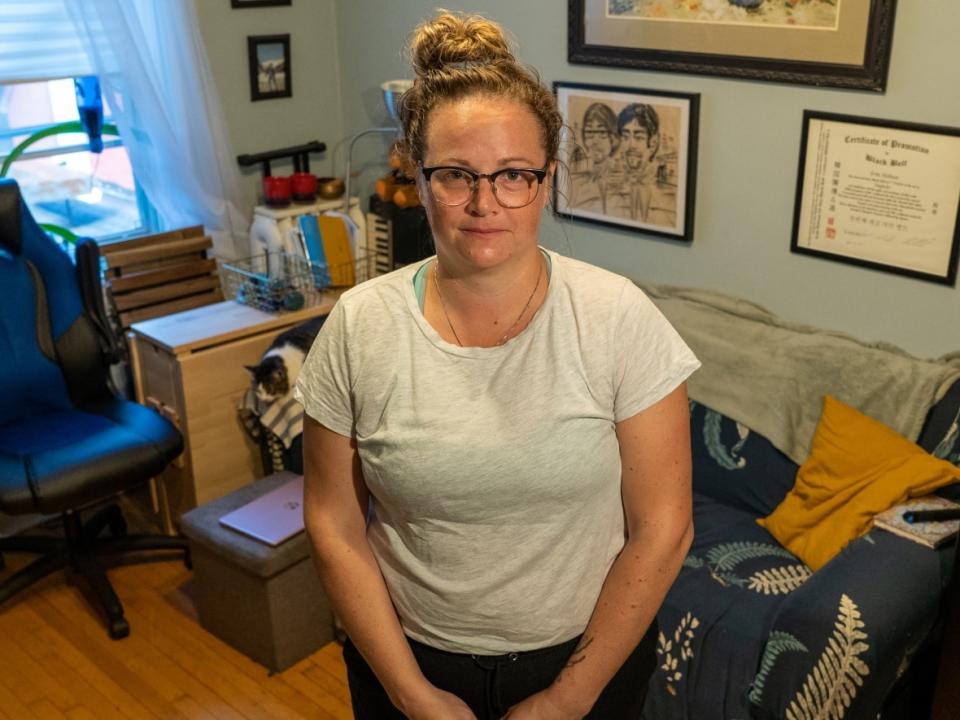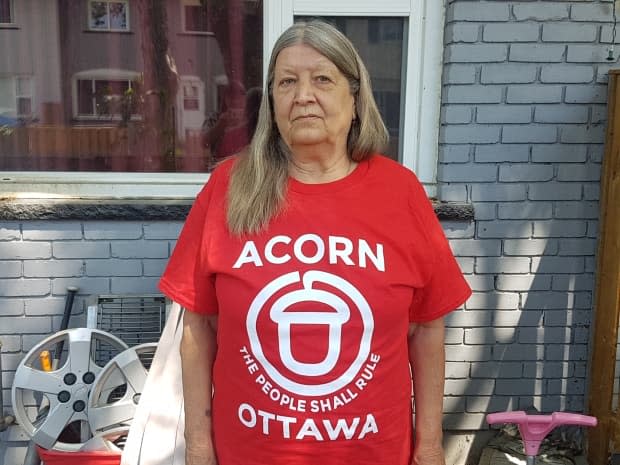Renters facing record-high prices, dwindling options in Ottawa

Renters in Ottawa are finding it increasingly difficult to secure affordable housing as rent prices soar to record-breaking heights and the number of listings continues to drop.
The latest data from RentFaster, a popular rental listings site in Canada, shows the average monthly price for a two-bedroom apartment, condo, townhouse, duplex or house in the city exceeded $2,000 per month for the first time this spring, reaching nearly $2,100 by mid-summer.
Meanwhile, the number of two-bedroom units available is now roughly half the number available last summer — around 130 listings compared to last summer's 310 listings.
Avg. rent of 2 bedroom unit in Ottawa ($)
CBC News spoke to three Ottawa residents who are currently searching for a place to rent about the challenges they're facing.
Grace Salomonie: Too expensive without roommates
For Grace Salomonie, a 21-year-old working professional, navigating the rental market means making difficult choices.
Salomonie had hoped to find a one-bedroom place all to herself. She wants a short commute to her downtown office where she's working to save enough money to go back to school, and to one day own her own home.
But so far, Salamonie hasn't been able to find anything within her $1,200 budget.
"I want to invest in my future," she said. "But with the current market in Ottawa, I'm not sure that I'd be able to have the future I dream of, or have my own house."
She's already had to alter her housing plan by living with roommates, she said. But she worries that as she gets older, she won't be able to set off on her own.
The current rental options available to her would eat up a large portion of her income, leaving little room for any savings, Salomonie said.
"It's been very, very expensive," she lamented.
Erin Hobson: Outbid on 3 occasions
Erin Hobson, 39, and her spouse lost out three times to competing bids from fellow renters.
"It's super frustrating as well because you want to set yourself up and your spouse and your families and everything to be successful for the future," she said about their plan to move into a two-bedroom unit.
"We're doing our best, but we're still not there yet."
Since 2020, the couple has been living in a cramped one-bedroom apartment in Centretown, where they store a canoe over their bed to save space.
They're trying to find a two-bedroom unit with outdoor space and a parking spot somewhere in the $1,500 to $3,000 per month price range.
Hobson said she's fortunate to work with a more lenient budget since she and her spouse both work full-time jobs.
After viewing apartments, Hobson said she was discouraged by how difficult it is to find reasonably priced units, and was surprised to be outbid again and again.
Hobson said she's considering holding off on searching for a bigger place, even if it means delaying plans like getting a dog or potentially having children in the near future.

Peggy Rafter: Looming eviction and homelessness
Peggy Rafter is among the roughly two dozen tenants facing eviction from Manor Village in Nepean, where low-rent townhouses are slated for renovation to make way for upgraded student housing units.
The retired senior has called her subsidized two-bedroom townhouse home for the past 30 years, but has been told to vacate by the end of September.
"It's scary," she said. "I'll probably end up in a shelter, as well as a few other people from here."
Rafter said she looks for a new place to live every day, but hasn't found anything comparable to her home that's also within her budget.
She currently pays less than $1,200 a month for her unit, which includes a finished basement and a backyard — all with utilities included.
So far, any similar units she's found in the city have been more than $2,000 a month, way beyond her budget.
"That's impossible for me or the other tenants here to be able to afford," she said.
Rafter has been working with the local chapter of ACORN Canada, a community social justice organization, to fight the eviction notice. She and the other tenants are waiting for a hearing date with Ontario's Landlord and Tenant Board, which adjudicates on rental disputes.
Rafter said her situation isn't unique, and she would like to see more action to protect low-income individuals from rising housing costs, including rent and vacancy control.
Finding affordable units 'pretty much impossible'
An undersupply of rental housing in the city is just one of the factors contributing to rising rents, said Meg McCallum, interim executive director of the Alliance to End Homelessness Ottawa.
McCallum said around 34 per cent of households in Ottawa are rentals, but fewer than half of those units are affordable.
"There's not enough rental stock to begin with. And when people are looking for affordable homes, there's so much competition," she said.
Newer units also have higher price tags to account for rising construction and operating costs.
Ironically, one of the measures used by the Bank of Canada to tame inflation appears to be exacerbating the problem: According to the Canadian Real Estate Association, rising interest rates are causing more people to forgo home purchases, opting to rent instead.
Vacancy rate for 2 bedroom units in Ottawa (%)
The squeeze is especially hard on low-income families, said McCallum.
"There's almost a zero per cent vacancy rate for affordable homes," she said.
"For someone who's working a minimum wage job or living on a pension or Ontario Works or receiving Ontario disability support payments, trying to find something that you can afford is pretty much impossible."
McCallum said a return to "normal" prices isn't enough, pointing out that even before the pandemic, the city was already dealing with a housing and homelessness emergency.
"We need to change the system, stop doing things the way we are doing them, and make use of the best practices that we can see around the country and internationally to really make some changes."

